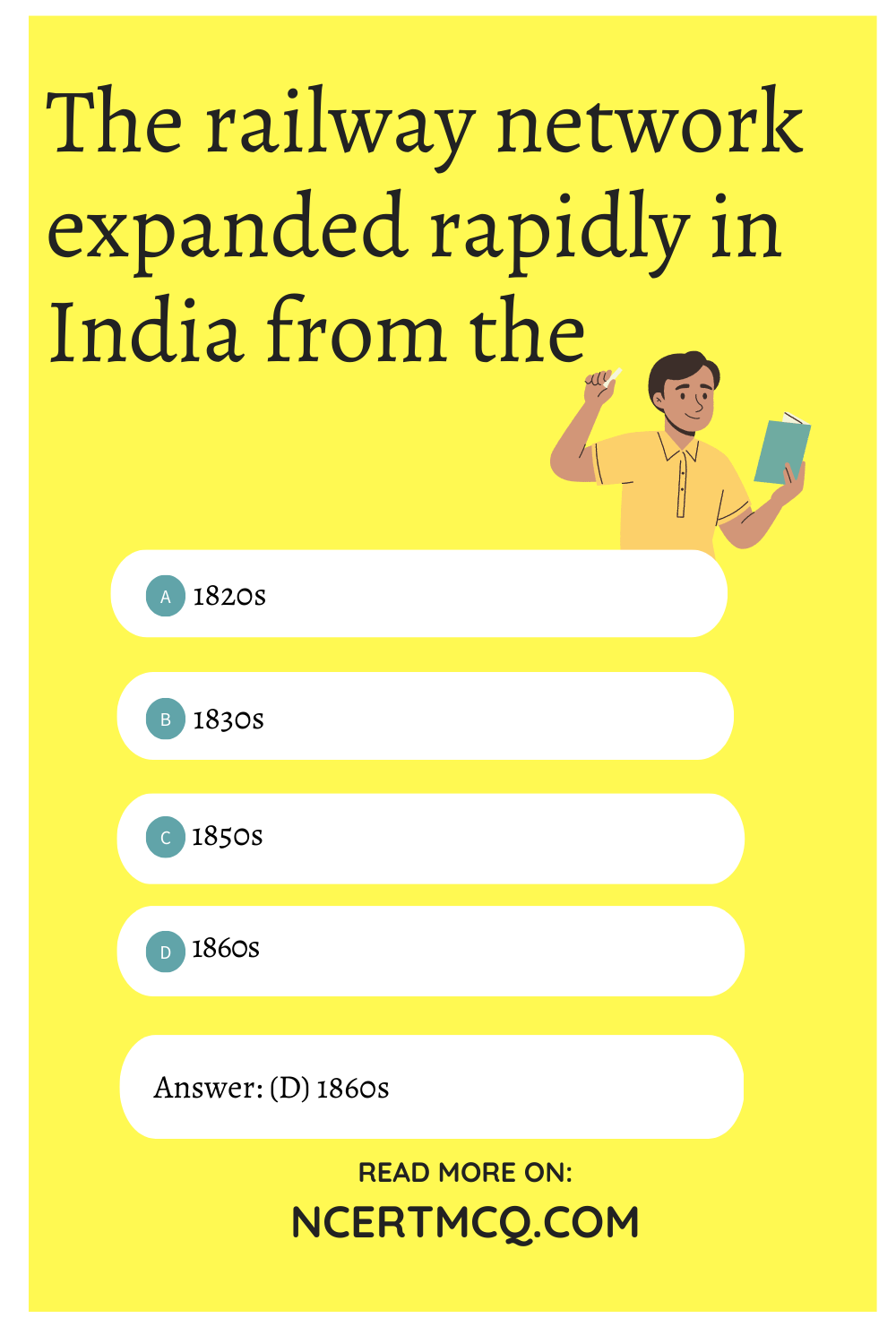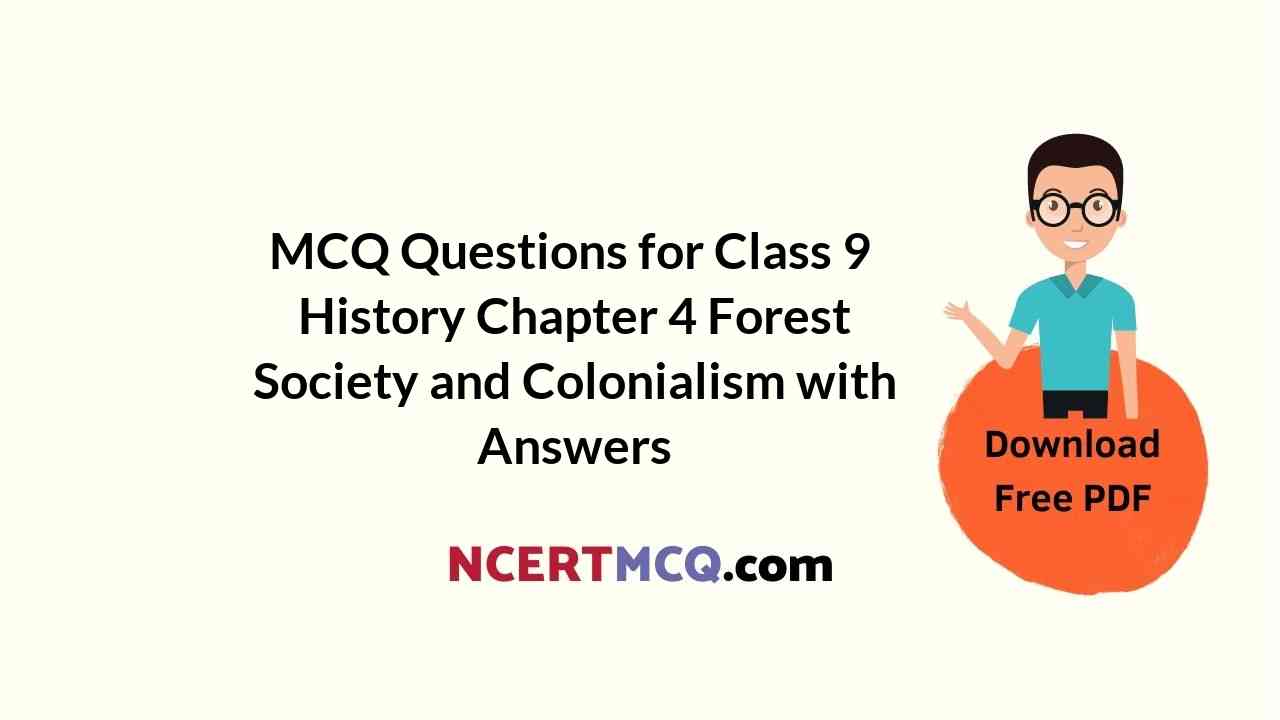Check the below Online Education NCERT MCQ Questions for Class 9 History Chapter 4 Forest Society and Colonialism with Answers Pdf free download. MCQ Questions for Class 9 Social Science with Answers were prepared based on the latest exam pattern. We have Provided Forest Society and Colonialism Class 9 History MCQs Questions with Answers to help students understand the concept very well. https://ncertmcq.com/mcq-questions-for-class-9-social-science-with-answers/
Class 9 Social Science History Chapter 4 MCQ With Answers
History Class 9 Chapter 4 MCQs On Forest Society and Colonialism
Choose the correct option:
Forest Society And Colonialism Class 9 MCQ Question 1.
Tendu leaves are used in making
(a) bidis
(b) plates
(c) baskets
(d) umbrellas
Answer
Answer: (a) bidis
Class 9 History Chapter 4 MCQ With Answers Question 2.
The railway network expanded rapidly in India from the
(a) 1820s
(b) 1830s
(c) 1850s
(d) 1860s
Answer
Answer: (d) 1860s

Forest Society And Colonialism MCQ Question 3.
The Imperial Forest Research Institute was set up at
(a) Allahabad
(b) Darjeeling
(c) Dehradun
(d) Shimla
Answer
Answer: (c) Dehradun
Class 9 History Chapter 4 MCQ Question 4.
Baigas are a forest community of
(a) Central India
(b) North India
(c) South india
(d) North-east india
Answer
Answer: (a) Central India
Forest Society And Colonialism Class 9 MCQ With Answers Question 5.
The colonial power in Indonesia were the
(a) English
(b) Dutch
(c) French
(d) Portuguese
Answer
Answer: (b) Dutch
MCQ On Forest Society And Colonialism Question 6.
Who were the colonial power in Indonesia?
(a) British
(b) Dutch
(c) French
(d) Portuguese
Answer
Answer: (b) Dutch
MCQ Of Forest Society And Colonialism Question 7.
Where did the Dutch start forest management in Indonesia?
(a) Java
(b) Sumatra
(c) Bali
(d) None of the above
Answer
Answer: (a) Java
Class 9 History Chapter 4 MCQ With Answers In Hindi Question 8.
The Kalangs resisted the Dutch in
(a) 1700
(b) 1750
(c) 1770
(d) 1800
Answer
Answer: (c) 1770
MCQs On Forest Society And Colonialism Question 9.
What was the system of ‘blandongdiensten’?
(a) A system of education
(b) Industrialisation
(c) First imposition of rent on land and then exemption
(d) None of the above
Answer
Answer: (c) First imposition of rent on land and then exemption
Question 10.
What was the policy followed by the British in India towards forests during the First and the Second World Wars?
(a) The forest department cut trees freely to meet British war needs
(b) Cutting of trees was strictly prohibited for everyone, including the British
(c) More and more trees were planted to give employment to Indians
(d) None of the above
Answer
Answer: (b) Cutting of trees was strictly prohibited for everyone, including the British
Question 11.
Who wrote the book ‘The Forests of India’ in the year 1923?
(a) David Spurr
(b) E.P. Stebbing
(c) Verrier Elvin
(d) John Middleton
Answer
Answer: (b) E.P. Stebbing
Question 12.
Indian Forest Service was set up in the year:
(a) 1865
(b) 1864
(c) 1854
(d) 1884
Answer
Answer: (b) 1864
Question 13.
The system of scientific forestry stands for:
(a)System whereby the local farmers were allowed to cultivate temporarily within a plantation
(b) System of cutting old trees and plant new ones
(c) Division of forest into three categories
(d) Disappearance of forests
Answer
Answer: (b) System of cutting old trees and plant new ones
Question 14.
In South-East Asia shifting agriculture is known as:
(A) Chitemene
(b) Tavy
(c) Lading
(d) Milpa
Answer
Answer: (c) Lading
Question 15.
Forests consisting of which type of trees were preferred by the Forest Department?
(a) Forests having trees which provided fuel, fodder and leaves
(b) Forests having soft wood
(c) Forests having trees suitable for building ships and railways
Answer
Answer: (c) Forests having trees suitable for building ships and railways
Question 16.
Which of the following is a community of skilled forest cutters?
(a) Maasais of Africa
(b) Mundas of Chotanagpur
(c) Gonds of Orissa
(d) Kalangs of Java
Answer
Answer: (d) Kalangs of Java
Question 17.
Wooden planks lay across railway tracks to hold these tracks in a position are called:
(a) Beams
(b) Sleepers
(c) Rail fasteners
(d) none of these
Answer
Answer: (b) Sleepers

Question 18.
Which of the following is a commercial crop?
(a) Rice
(b) Wheat
(c) Cotton
(d) Maize
Answer
Answer: (c) Cotton
We hope the given NCERT MCQ Questions for Class 9 History Chapter 4 Forest Society and Colonialism with Answers Pdf free download will help you. If you have any queries regarding Forest Society and Colonialism CBSE Class 9 History MCQs Multiple Choice Questions with Answers, drop a comment below and we will get back to you soon.
Class 9 Social Science History:
- The French Revolution Class 9 MCQ
- Socialism in Europe and the Russian Revolution Class 9 MCQ
- Nazism and the Rise of Hitler Class 9 MCQ
- Forest Society and Colonialism Class 9 MCQ
- Pastoralists in the Modern World MCQ
- Peasants and Farmers Class 9 MCQ
- History and Sport The Story of Cricket Class 9 MCQ
- Clothing A Social History Class 9 MCQ
